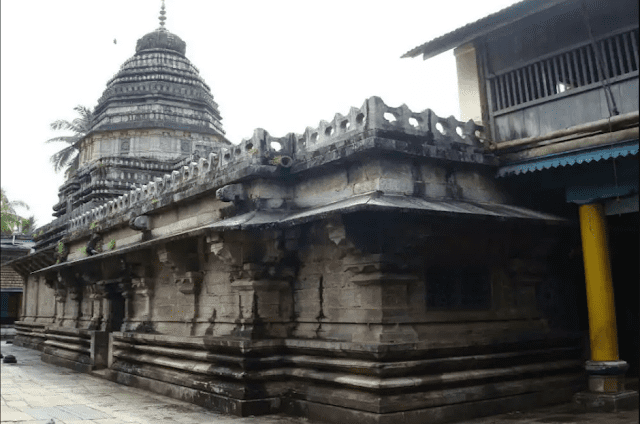The Mahabaleshwar Temple Gokarna is a 4th-century Hindu temple situated in Gokarna, district of Uttara Kannada, the state of Karnataka, India, designed in the classical the architectural style of Dravid. It’s a religious pilgrimage site. The Gokarna temple faces the Arabian Sea Karwar city beach where Hindu pilgrims clean up before they enter the temple for worship.
The Mahabaleshwar temple is considered as holy as the temple of Shiva on the banks of the Ganges River in Varanasi and Kasi (Kashi) in North India. Therefore, Gokarna is known as the Dakshin Kasi, the temple of Mahabaleshwar. The temple is one of the seven sacred Muktikshetras or Muktistala in Karnataka. The Gokarna Mahabaleshwar temple is run under the supervision of SriramachandrapurMath’s Paramapoojya Jagadguru Gokarna Mandaladheeshwara Shree Shree Raghaveshwara Bharathi Mahaswamiji.
Gokarna Temple History:
The Gokarna temple myth as told links Ravana of the Ramayana, Lanka’s demon lord, not only with the deified Shiva Linga in the Mahabaleshwar Temple but also with the Bhadra Kali temple of Gokarna. The myth also gives the place name “Gokarna” etymology.
Ravana’s mother Lord Shiva’s ardent devotee, worshipped a Shiva Linga to give her son prosperity. The Lord of Heaven, Indra, who was jealous of this worship, took the Shiva Linga and threw it into the sea. Ravana’s depressed mother went on a hunger strike as it interrupted her devotional worship of Shiva.
Ravana then promised his mother that for her worship he would go to Mount Kailash, Lord Shiva’s home, and give the main Atmalinga himself. Ravana then carried out severe penance at Mount Kailash to please Lord Shiva and also sang the praises of Shiva (Shiva Tandava Stotram) in his melodious voice. He even cut his own head and made a harp with threads drawn from his skin and intestine. He appeared before him, please, Lord Shiva, and requested him what he wanted. Narada had asked Lord Vishnu to change the mind of Ravana by this time.
Ravana asks Goddess Parvati as a result of this plot, and Lord Shiva offers him “fake Parvati.” Narada tells Ravana on his way back to Lanka that Lord did not give him the real Parvathi and that the real Parvathi was in Pathala. So Ravana frees his wife, goes to Pathala and marries the daughter of a queen, “mandodri.”
Ravana returned to Lanka, where he was asked by his mother for the Atma-Linga. Ravana discovered Lord Vishnu’s tricks on him. Then he prayed again to Lord Shiva, asking for his forgiveness. Lord Shiva has risen and this time as his gift, Ravana asks the Atma-Linga. Lord Shiva agrees to give him the boon that he should never be placed on the ground.
While Ravana was approaching Gokarna, Lord Vishnu was blotting out the sun to make dusk appear. Ravana had to conduct his evening rituals now, but he was worried that he would not be able to do it with the Atma-Linga in his hands. At this time, he was assaulted by Lord Ganesha in the disguise of a Brahmin child. Ravana told him to keep the Atma-Linga before he did his rituals, and he begged him not to place it on the table. Ganesh made a deal with him that he’d call Ravana three times, and if Ravana didn’t come back in that time, he’d put the Atma-Linga on the floor.
Ganesha quickly called out three times, but within the specified time Ravana could not come. Lord Ganesha set the Atmalinga on the ground, fooled Ravana and disappeared with his cows from the scene even before Ravana could return. The only cow that was going underground was then pursued by Ravana.
Ravana then tried hard to lift the Shiv Linga but failed because it had been firmly fixed. Ravana also fainted; he subsequently gave the Atmalinga the title “Mahabaleshwar” (which means all-powerful). According to the legend, the place now boasts three divine deities, namely: Gokarna, the cow’s ear; the Atmalinga or Shiva Linga deified in the Mahabaleshwar Temple; and the Goddess Bhadrakali, all of whom are now holy places of worship integral to Gokarna.
Mahabaleshwar Temple Gokarna Timings:
Morning: 6 am to 12 pm.
Evening: 5 pm to 8 pm
Gokarna Temple Annadanam Timings:
Afternoon: 12 pm to 2 pm
Evening: 7.30 pm to 8.30 pm
Gokarna Temple Pooja Details
Sankalpa Pooja Mangalaarathi – 50.00
Ashtottara Bilvarchana Pooja – 151.00
Kumbhabhishek & Kshirabhishek Pooja – 251.00
Panchamrutabhishek Pooja – 351.00
Maha Panchamrutabhisheka Pooja (including Rudrabhisheka Pooja) – 451.00
Navadhanya Abhisheka Pooja – 651.00
Silver Nagabharana special Pooja – 1,501.00
Gold Nagabharana special Pooja – 2,001.00
Other Attractions of Gokarna Temple:
Sri Maha Ganapathi temple:
History has it that the temple of Sri Maha Ganapathi was built in memory of the Ganesha child. Ganesha deceived the Ravana demon and rescued the Atmalinga now installed in the temple of Mahabaleshwar. Ganesha’s granite image is inside the temple. The picture is 5 feet (1.5 m) high and two-handed; the hole is said to be a result of a violent blow from Ravana at the top of his head. The temple has its own name and is also referred to as “Sidda Ganapati”
Gogarbha:
The Atmalinga, which vanished in the form of gov (cow), created a cave in a nearby hill, according to legend. It is called “Gogarbha” which means “cow’s womb.” Sadhus visit the cave and uses it as a place of rest. Folklore suggests that sadhus enter Gogarbha and reach the sacred city of Kashi (Old Varanasi), the ultimate pilgrim visiting the place.
Kotitheertha:
Kotitheertha is a man-made pond used to immerse idols and to bathe ritually. It is surrounded by temples and has a small platform in the center. Devotees usually take a bath in the pond before visiting for worship at the Mahabaleshwar Temple.
Mahabaleshwar Temple Location: Mahabaleshwara Temple Gokarna, Koti Teertha Rd, Kotiteertha, Dandebagh, Gokarn, Karnataka 581326
Gokarna Temple Dress Code:
Visitors wearing jeans, T-shirts or Bermuda shorts can no longer join Gokarna in Karnataka’s Mahabaleshwar Temple
Gokarna Mahabaleshwar Temple Photos:

